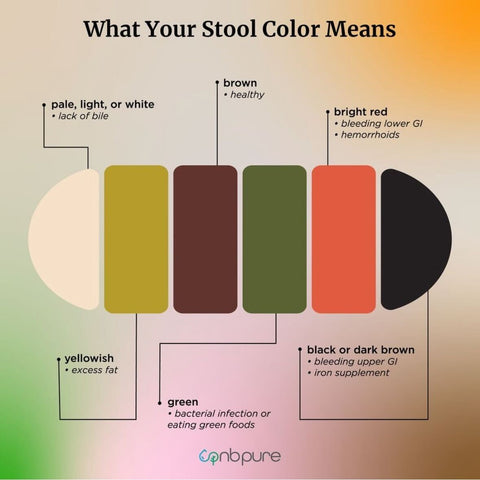
Is your poop normal? How to tell
, by Alex Fryer, 6 min reading time

, by Alex Fryer, 6 min reading time
It’s a question many people have — but not one many want to ask. But it’s such an important topic. Your poop (aka stools, feces, or bowel movements) say a lot about the state of your gut — and can even be an important indicator of health.
But let’s start with the basics: What exactly is poop? It’s waste from the body. And more specifically, it’s the remains of food not digested in the intestines. This includes any food not broken down by important bacteria in the gut. (Gut bacteria help to digest food so the body can absorb important nutrients from that food.)
You should be pooping regularly, that is, more than just three times a week. If you’re going three times or less, you’re constipated and probably bloated and gassy too — and may need help getting things moving again to get back on track.
Having pooping trouble? Get back on track with MagO7, the leading product to relieve constipation.
There are some easy ways to tell if your poop is normal. Here are some of the most common ways:
Consider the well-known poop emoji. That’s the healthy brown color you want your poop to be. If your poop is light colored, it may be a sign of inflammation in the intestines. Or it could be a side effect of a medication you may be taking. If it continues, be sure to consult with your doctor.
Keep in mind that what you eat can affect your poop color — and that’s okay because it has a known cause. For example, eating plenty of antioxidant-rich blueberries or leafy greens — which are good for you — may turn your poop green or a darker brown or even blackish color. Food coloring can also change the color of your poop, as can iron supplements, which can turn your stools black.
Red poop is usually caused by blood in the stools. If it’s a bright red, it could be caused by hemorrhoids, swollen glands in the anus or rectum. Darker red stools may be caused by bleeding in the upper part of your intestines. If this continues, book an appointment with your doctor.

Your stools should be a couple inches long. That’s a healthy poop. But many of us are pooping out tiny hardened stools. That’s not good and is a sign of constipation. If this is you, you may need to use a product like NBPure’s MagO7 to help get your poops coming out more regularly.
Thousands of 5-star reviews don’t lie: MagO7 works, gently! Just take before bed for a gentle bowel movement in the morning.
Poop should be a softish firm, not too firm and not too soft. But it shouldn’t be hard and difficult to pass. If it is, you’re probably constipated. And if it’s runny or loose, you may have diarrhea. If you find that you consistently have diarrhea, call your doctor. It could be a sign of an infection, food allergy or food intolerance, or other digestive problems.
Another way to tell if your poop is healthy: it should sink, not float. Floating poops can sometimes be accompanied by gas — and may be a sign you’re not digesting food properly. If this continues, you may want to try a digestive enzyme with meals. Digestive enzyme supplements support the body’s natural digestive enzymes to help break down food.
Try Enzybiotic, the supplement with digestive enzymes and probiotics for a more balanced gut.
If poop is too hard, you may not be getting enough fiber in your diet. Fiber, along with drinking plenty of water, is critical for stools that are easy to pass on a regular basis. You need 25 to 38 grams of fiber daily — but 90% of us are not getting enough. NBPure’s Daily Multi-Fiber is a complete form of both soluble and insoluble fiber and also contains prebiotics and probiotics for a healthier gut.
Foul-smelling poop is usually a sign something’s off in the gut. It should never smell this bad. Eating food rich in sulfates like broccoli and beans could cause your stools to smell off. But stinky stools could be caused by not digesting food properly, infections, or even medications like some antibiotics.
If the smell lasts, talk to your doctor. It’s fine to have things be off once in a while. But too frequently may indicate a more serious problem particularly if accompanied by blood in the stools, abdominal pain, fever, or even unexplained weight loss.
Keep in mind that lots of spring leafy greens could also turn your poop green, but this is typically temporary. What can help with your poop overall: eating a variety of lighter spring foods like fresh berries, asparagus, peas, and avocados while limiting heavier comfort foods. The goal of spring: eat for the season!
Try Daily Multi-Fiber. 5 types of fiber plus prebiotics and probiotics to support gut health and regularity.
Becoming familiar with your poop — and how often you’re pooping — is important for health. It can usually be an early sign that something’s off in your gut. And this may be easy enough to fix with healthy gut products like an overnight cleanse, digestive enzymes, and probiotics.